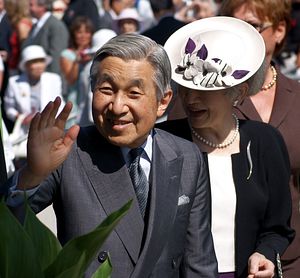At the end of the month, India will be hosting Emperor Akihito and Empress Michiko of Japan in what will be the first ever official visit to India of a sitting Japanese monarch. The visit will begin on the November 30 and conclude on December 6. The Japanese imperial couple has been to India before – they visited in 1960 for their honeymoon as the then-Crown Prince and Princess of Japan. This time, the couple are visiting at the invitation of Indian President Pranab Mukherjee. The Indian Ministry of External Affairs, who will be coordinating the visit, issued a statement saying that “The visit will immeasurably expand and strengthen the India-Japan Strategic & Global Partnership.”
The visit is greatly anticipated in India and is being widely reported across the media. It has prompted some political commentators to reflect on the India-Japan bilateral relationship in terms of their ancient civilizational linkages – something that Indian and Japanese diplomats often refer to in their rhetoric. For example, Sanjaya Baru, in a column on the visit for The Indian Express, writes “Both India and Japan must avoid the temptation and the trap of viewing their bilateral relationship merely from the contemporary prism of the world we live in now, and remind themselves that their relationship is based on the firm foundations of an ancient civilisational link. … One would imagine that this is the message that the emperor and empress of Japan would want to convey to their Indian hosts.”
Although the Emperor of Japan is a purely ceremonial actor under the contemporary Japanese constitution (which describes him as “the symbol of the State and of the unity of the people”), the visit is sure to galvanize positive public opinion toward the bilateral relationship in India. Domestic politics have not generally been a setback for India-Japan ties, which have have grown considerably since Prime Minister Yoshiro Mori’s landmark visit to New Delhi in 2000. The relationship enjoys strong support across the political spectrum in both India and Japan.
The visit also comes a couple of months ahead of Japanese Prime Minister Shinzo Abe’s planned visit to India in January, likely as the chief guest of honor at India’s Republic Day celebrations. India and Japan conduct annual visits with each other at the head of government level. Abe’s last visit was notable for his path-breaking “Confluence of the Two Seas” at the Parliament of India, in which he set forth a vision for a major Indian and Japanese role in the future security architecture of the Asia-Pacific region. Abe has made his appreciation for India known regularly, often fondly recalling Indian Judge Radhabinod Pal – the sole dissenting judge at the Military Tribunal for the Far East’s trial of Japanese war criminals. Indian Prime Minister Manmohan Singh traveled to Tokyo in May 2013.
Relations between Japan and India – thought not without their trials – have been remarkably warm in the 21st century. India – which has traditionally been non-aligned and eschewed alliances – has marked Japan as a major strategic partner in Asia. Japan, despite its reservations about India’s nuclear posture, has engaged India along economic and security lines – even symbolically ending its self-imposed ban on the export of defense equipment in the case of India. Although diplomats remain hesitant to publicly comment on the role of China in driving the relationship, India and Japan both have territorial disputes with China.

































